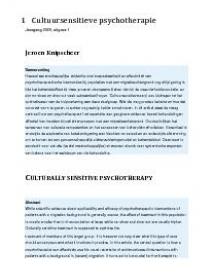Cultuursensitieve psychotherapie
Hoewel wetenschappelijke evidentie over toepasbaarheid en effectiviteit van psychotherapeutische interventies bij populaties met een migratieachtergrond nog altijd gering is, lijkt het behandeleffect bij deze groepen doorgaans kleiner dan bij de meerderheidspopulatie, en zijn no-show en drop-out vaak substantieel hoger. ‘Cultuursensitieve zorg’ zou bijdragen tot het optimaliseren van de hulpverlening aan deze doelgroep. Wat die zorg precies behelst en hoe dat concreet vorm te geven, is echter nog weinig helder omschreven. In dit artikel staat de vraag centraal hoe een psychotherapeut het repertoire aan gangbare evidence-based behandelingen effectief kan inzetten bij patiëntengroepen met een migratieachtergrond. Cruciaal blijken het verwerven van culturele competenties en het aanpassen van behandelmethodieken. Essentieel is enerzijds de exploratie van betekenisgeving aan klachten en oorzaken en anderzijds afstemming om te komen tot een gemeenschappelijk ziekteverklaringsmodel en behandeldoel. Daarnaast is aandacht voor actuele (veelal maatschappelijke) stressoren alsook voor systemische aspecten van belang voor het welslagen van de behandeling.
Abstract
While scientific evidence about applicability and efficacy of psychotherapeutic interventions of patients with a migration background is generally scarce, the effect of treatment in this population is mostly smaller than in the population at large while no-show and drop-out are usually higher. Culturally sensitive treatment is supposed to optimise the
treatment of members of this target group. It is however not very clear what this type of care should encompass and what it involves in practice. In this article, the central question is how a psychotherapist can effectively use his usual repertoire of evidence based interventions with patients with a background in (recent) migration. It turns out to be crucial for the therapist to acquire cultural competencies and to adapt his methods of treatment. On the one hand, the
exploration of meaning of symptoms and their cause is essential. On the other hand, it is crucial to end up with a common model that explains the illness and defines the goal of the treatment. Next to that, in order to reach therapeutic goals, attention needs to be given to current (mostly societal) stress factors and to systemic aspects.
Geachte bezoeker,
De informatie die u nu opvraagt, kan door psychotraumanet niet aan u worden getoond. Dit kan verschillende redenen hebben,
waarvan (bescherming van het) auteursrecht de meeste voorkomende is. Wanneer het mogelijk is om u door te verwijzen naar de bron
van deze informatie, dan ziet u hier onder een link naar die plek.
Als er geen link staat, kunt u contact opnemen met de bibliotheek,
die u verder op weg kan helpen.
Met vriendelijke groet,
Het psychotraumanet-team.
In: Tijdschrift voor Psychotherapie ISSN: 1876-5637 | 2020 | 1
https://www.tijdschriftvoorpsychotherapie.nl/archief/jaargang-2020-uitgave-1/11649/
Online verschenen 22/01/2020 Themanummer Cultuur


